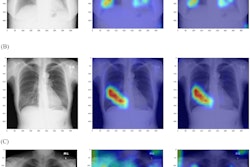Based on recent correlations between venture capital funding and U.S. Food and Drug Administration (FDA) clearances, the number of FDA-cleared radiology AI offerings is expected to increase substantially in coming years, according to analysis published October 16 in the Journal of the American College of Radiology.
A team led by data scientist Nicole McNabb from the American College of Radiology (ACR) Data Science Institute reviewed FDA clearance data from 2008 to 2022 and AI funding data from Rock Health from 2013 to 2022. The team estimated that for every $1 billion in venture capital funding, 11 radiology AI applications achieved FDA clearance between 2018 to 2022. Based on past venture capital investments and an average six-year lag between funding and FDA product clearance, the researchers projected that approximately 66 new radiology AI software applications will have received clearance in 2023.
And that growth is expected to continue. Assuming the current trend in VC funding continues, the researchers project that the number of FDA-cleared radiology applications will reach about 147 by 2028 and approximately 350 by 2035.
“Medical imaging accounts for 85% of digital health’s venture capital funding,” wrote McNabb and colleagues. “As funding grows, it is expected that AI products will increase commensurately … given the statistical association between historical funding and FDA-approved AI products.”
In their analysis, the researchers used linear regression to estimate the association between new products approved in a certain year, based on the lagged funding (i.e., product-year funding). They then utilized projection models to estimate the number of FDA-cleared applications based on either five-year, six-year, or seven-year lag times.
The projection models for all three lag lengths highlight the strong correlation between lagged funding and FDA-cleared radiology AI products entering the market, according to the authors.
"AI is likely to change the practice of diagnostic radiology over time as new products are developed and integrated into practice," McNabb and colleagues concluded. "Furthermore, as AI products are integrated into practice, it may incentivize increased investment for future AI products."
The full study can be found here.




















